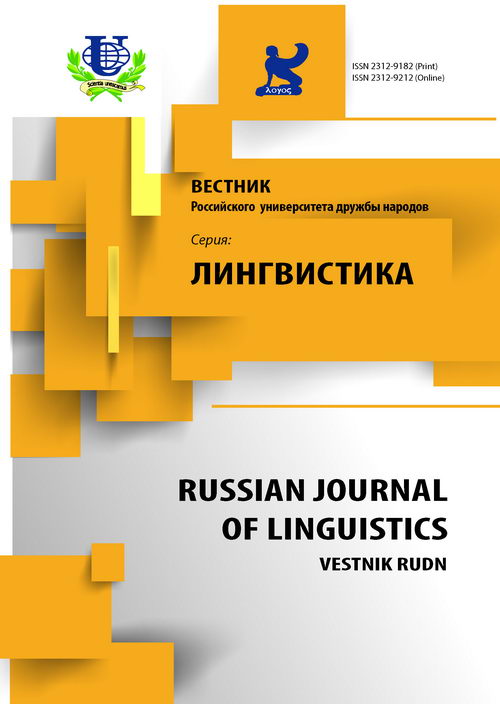No 3 (2008)
- Year: 2008
- Articles: 13
- URL: https://journals.rudn.ru/linguistics/issue/view/574
Articles
Phonetic and stylistics database of OF Smerdyakov's discourse
Abstract
Various peculiarities of phonetic analysis in communicative stylistics of text are disclosed in the present report. The subject of the report is the experience of the examination of the oral speech of Smerdyakov. The article contains the results of research of phonetic database of Smerdyakov along with the influence of his social status.
Russian Journal of Linguistics. 2008;(3):5-12
 5-12
5-12


 13-22
13-22


 23-27
23-27


English language diachronic morphologic change causes new point of view
Abstract
Any language is a systematic-structural organization. Its inner structure is characterized by having an ability to self-development. The self-organization theory offers new ideas of diachronic language change causes explanation. The English language morphological changes causes of early stages development must be thought of as a combination of inner language abilities to self-development and extra linguistic factors.
Russian Journal of Linguistics. 2008;(3):28-32
 28-32
28-32


 33-37
33-37


On some peculiarities of the political discourse of the Spanish government President Mr. Rodrнguez Zapatero
Abstract
The article considers some peculiarities of the political discourse based on some speeches by the President of Government of Spain Mr. Jose Luis Rodrнguez Zapatero in the UN, the Spanish Parliament, press-conferences and TV interviews.
Russian Journal of Linguistics. 2008;(3):38-43
 38-43
38-43


 44-50
44-50


 51-55
51-55


Role of Articles in Formation of Communicative Perspective of English Utterance
Abstract
The subject matter of the paper is related to the well-known general problem of the functional perspective of the English utterance, the latter, however, is seen here as a two-fold phenomenon, splitting within itself into semantic relations between the communicative elements, depending on the use of articles, and the informative structure of the utterance, which is not the target of the paper. The author examines the characteristics of the English articles, enabling to treat them as linguistic units which form the syntax of speech, the latter being differentiated from syntactic models being part of language. Thus the paper clearly distinguishes language and speech. Special attention is given, on the one hand, to semantic relations between the communicative elements of the utterance and, on the other hand, to semantic relations between such communicative elements, articles being the main linguistic units molding communicative elements proper and semantic relations between them.
Russian Journal of Linguistics. 2008;(3):56-62
 56-62
56-62


 63-68
63-68


Invective denominations of negative traits of character and antisocial patterns of behaviour in the spanish and american linguistic communities
Abstract
On the basis of the comparative approach the article deals with the national specific features of the invective means referring to a person's character and antisocial behavioral models in the Peninsular National Variant of the Spanish language and the American National Variant of the English language.
Russian Journal of Linguistics. 2008;(3):69-74
 69-74
69-74


Comparative analysis of main functional features of «compliment» as speech event in english and spanish linguistic cultures
Abstract
The article deals with the general comparative analysis of main forms of the communication concept «Compliment» in English and Spanish cultures from the point of view of its stylistic form, main functions, and communicative intentions of the speech event participants.
Russian Journal of Linguistics. 2008;(3):75-79
 75-79
75-79


The learner's errors theory and metasense in discourse
Abstract
The author discusses the learner's errors theories stemming from phycolinguistics, pragmalinguistics and language learning psychology. In the theory of discourse the scientists are concerned with the problems of understanding the metasense in communication, the way people extract information from extralinguistic sources, and how they overcome obstacles in intercultural communication. Reasons for communicative failures are considered from the pragmalinguistic standpoint. The author believes that elimination of communicative failures of pragmalinguistics nature calls for comments and explanatory notes different from those of traditional lexico-grammatical type. Innovation strategies in commenting with account of psycholinguistic factors are being developed within the lacuna theory; they could be included in the learner's errors theory.
Russian Journal of Linguistics. 2008;(3):80-85
 80-85
80-85
















